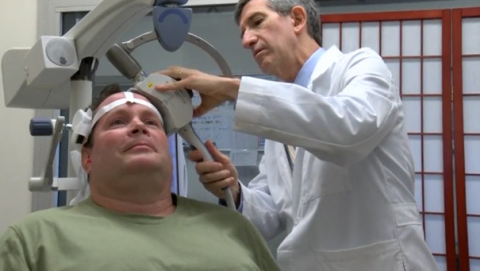
LOS ANGELES, United States (Reuters) — Doctors in California say transcranial magnetic stimulation (TMS) can help ‘rewire’ the brains of people with depression, offering hope for patients whose condition is not helped by medication or therapy.
Depression is one of the most common forms of mental illness, affecting more than 350 million people worldwide. It is ranked by the World Health Organization as the leading cause of disability globally.
Treatment usually involves either medication, some form of psychotherapy or a combination of both. Yet many patients fail to get better and suffer recurring bouts of illness.
TMS is approved by the United States Food and Drug Administration for people whose depression isn’t improved with medication. The Semel Institute for Neuroscience and Human Behavior at the University of California Los Angeles is one of a small number of medical facilities offering the treatment to patients with depression. The therapy, which beams targeted magnetic pulses deep inside patients’ brains, will soon be available to more people, the institute says, with the introduction of new equipment this summer. It may also reduce the duration of a treatment session.
Andrew Leuchter, director of the institute’s TMS Clinical and Research service, says the treatment can effectively ‘rewire’ the brain by changing how brain circuits are arranged.
“By pulsing it with energy repeatedly, we’re changing the way that area works, but also changing the way the whole brain network works,” he said.
For Bob Holmes, who has suffered from depression for as long as he can remember, the treatment has been life changing.
“I would recommend it a hundred percent. I have spoken to a number of people who have depression, given them my opinion, and I think it’s a wonderful program. It’s been a life-saver for me, and I’m very grateful that I found it, and I’m very grateful for the people here,” he said.
A session of TMS for depression normally takes 30 minutes to an hour, and people typically receive the treatment several days a week for six weeks. But Leuchter hopes the newest generation of equipment could decrease the length of a treatment session from 37.5 minutes down to 3 minutes, allowing a patient to complete a course in two weeks.
UCLA says doctors are also exploring whether the treatment could also be used for other conditions, like schizophrenia, epilepsy, Parkinson’s disease and chronic pain.







